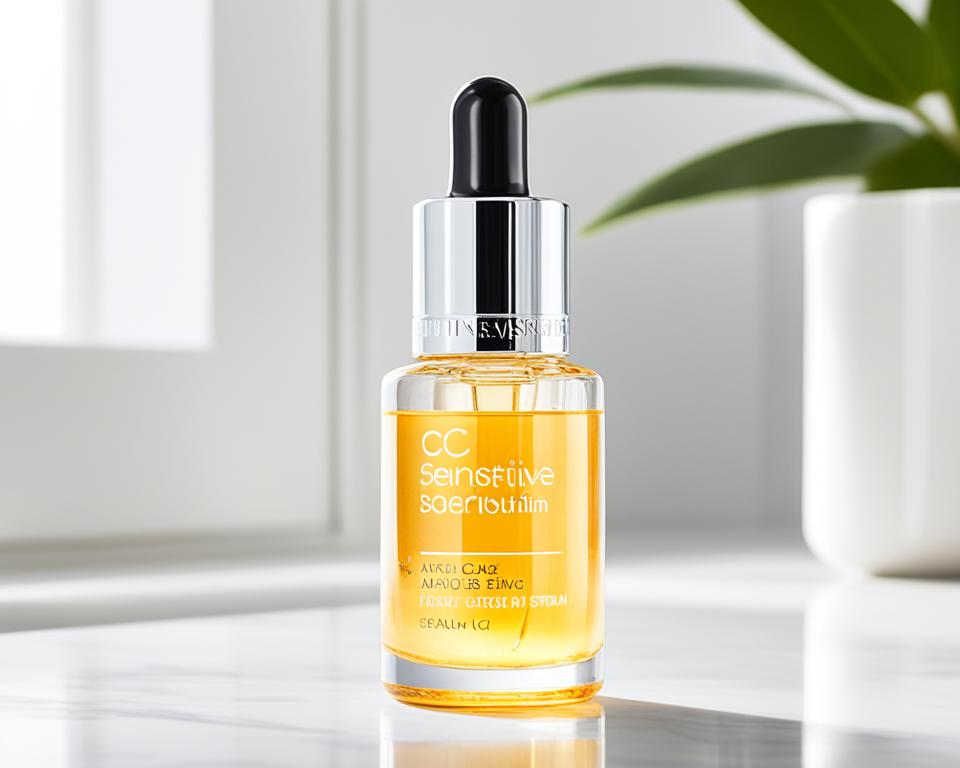Skincare can be tough for people with sensitive skin. Yet, vitamin C shines as a gentle, effective helper. Known for its skin-brightening and protective effects, it’s great for all.
This guide will delve into vitamin C’s wonders for sensitive skin. We’ll cover how it fights redness, fixes uneven tone, and tackles early aging. All this while keeping your skin’s health intact.
Does rosacea or eczema bother you, or does your skin just get irritated easily? You’re in the right place. Learn to use vitamin C daily for a glowing, healthy face. Let’s dive in and see vitamin C’s magic on sensitive skin.
Read more interesting information at ::sportsnews1
Understanding Sensitive Skin and Vitamin C
Sensitive skin is not simple. It has many causes like weather, pollution, and UV rays. These things can break the skin’s barrier, making it more sensitive. Also, some chemicals in skincare products can cause reactions.
Health issues like rosacea and eczema can make skin more reactive. This can cause redness, irritation, and discomfort.
The Benefits of Vitamin C for Sensitive Skin
Vitamin C is great for sensitive skin. It protects against the bad effects of the outside world. This makes the skin’s barrier stronger and helps reduce redness.
So, using products with vitamin C is safe for many. They can help make your skin glow. Products like these are gentle and good even for sensitive skin types.
“Vitamin C is a must-have ingredient for sensitive skin types. Its powerful antioxidant properties and ability to support the skin’s natural barrier make it a game-changer in managing skin sensitivity.”
Choosing the Right Vitamin C Product
When picking soothing vitamin c serum or skin care for sensitive types, think about potency and concentration. Make sure it’s made for gentle use on your face.
Potency and Concentration
The power and amount of vitamin C can make a big difference. For sensitive skin, choose lower amounts, usually 5-15%. More than this might dry out your skin.
Formulation and Delivery Systems
How the product is made and how it’s used matters for sensitive skin. Pick ones with soft ingredients that don’t block pores. Stay away from alcohol, fragrance, and strong chemicals. Also, watch out for types of vitamin C. Some, like L-ascorbic acid, could irritate your skin more.
| Vitamin C Form | Potential Irritation Level |
|---|---|
| L-ascorbic acid | High |
| Sodium ascorbyl phosphate | Moderate |
| Ascorbyl glucoside | Low |
Check carefully the vitamin C product’s potency, concentration, and makeup. This way, you can find one that’s both gentle and does the job well, without making your skin red or itchy.
“Choosing a vitamin C product that’s made to be gentle is key for sensitive skin.”
Vitamin C for Sensitive Skin: Benefits and Precautions
Vitamin C is great for those with sensitive skin. It can reduce inflammation, make your skin glow, and boost collagen. It’s gentle enough for all skin types.
It helps with redness and swelling, perfect for skin conditions like rosacea. By reducing inflammation, vitamin C restores your skin’s barrier, making it stronger.
Vitamin C also brightens your skin. It fights off dullness caused by free radicals. This makes your skin look more radiant, even if it’s sensitive.
It’s also good for making your skin more elastic by boosting collagen. This can lessen wrinkles and make your skin appear younger. So, it’s not just about looking good, but feeling good about your skin too.
But, be careful when using vitamin C. It might cause irritation or dryness in some. Start with a low dose and increase it slowly to avoid this.
Choose vitamin C products made for sensitive skin. Opt for serums or creams with calming ingredients like hyaluronic acid or aloe vera. They help prevent irritation.
Learning about vitamin C’s benefits and how to use it safely is key. It helps you get that healthy, glowing skin you want. Remember, always check with a skin doctor if you’re unsure.
Introducing Vitamin C to Your Routine
Adding vitamin C to a sensitive skin care plan needs caution. This antioxidant can do a lot of good for sensitive skin. Introduce it slowly to prevent irritation.
Patch Testing for Sensitivity
It’s smart to do a patch test before using a lot of vitamin C. Patch testing means putting a little of the product on a spot like your inner arm. Watch for 24-48 hours for any bad reactions. This lets you see if your skin likes the product or not before using it on your face.
Gradual Integration and Frequency
- Start with a low dose of vitamin C, like 5-10%, and slowly use stronger amounts as your skin gets used to it.
- Use the serum or product once or twice a week at first. Then, add more days as your skin gets better with it.
- If your skin turns red or feels bad, stop using it right away. Talk to a skin doctor if this happens.
Going slow and steady with vitamin C for sensitive skin is key. You’ll get all the good without the bad. Be ready to change your routine if needed.
“Slow and steady wins the race when it comes to introducing vitamin C to sensitive skin.”
Vitamin C for Sensitive Skin
Adding vitamin C to a skincare routine for sensitive skin should be done carefully. The goal is to get the benefits without causing redness or swelling. Luckily, there are vitamin C products made especially for sensitive skin.
Vitamin C can be great for sensitive skin. It helps with redness, swelling, and makes the skin tone more even. This is because it soothes irritation and brightens the skin.
Choose a gentle vitamin C product wisely. Look for ones with types of vitamin C that are less likely to irritate, like ascorbic acid or vitamin C esters. These milder types still give you the good parts of vitamin C without the bad.
Good vitamin C serum should also have things that calm and hydrate the skin, like aloe vera. This helps your skin’s barrier stay strong and reduces how sensitive it feels. So, the right product can help your skin without causing more problems.
“Vitamin C is a game-changer for sensitive skin, but it’s crucial to find the right formulation to avoid irritation. Look for gentle, stabilized versions of the ingredient that are combined with soothing, nourishing components.”
Combining Vitamin C with Other Ingredients
Vitamin C is great for taking care of sensitive skin. But, it’s important to know how it works with other skincare ingredients. This helps it work best and prevents any skin problems.
By mixing vitamin C with certain other ingredients, you can make your skin feel better. You’ll get a soothing, gentle routine that’s just right for you.
Synergistic Combinations
Vitamin C works really well with some ingredients. This makes it even better for sensitive skin. For example, if you use best vitamin c for rosacea with niacinamide, it can help reduce redness.
Or, using vitamin C with hyaluronic acid can make your skin more hydrated and plump. Another good mix is hypoallergenic vitamin c serum with vitamin E. These two fight against harmful substances and leave your skin looking healthier.
Ingredients to Avoid with Vitamin C
Vitamin C is good for sensitive skin, but it doesn’t work well with some things. Don’t mix it with strong exfoliants, retinoids, or acids. These can hurt your skin.
Avoid using vitamin C with metals like copper or iron, too. They can make the vitamin C not as useful.
Choosing the right mix of ingredients is key. And staying away from ingredients that don’t agree with vitamin C. Doing this lets you use vitamin C to its full benefit, making your skin feel great. With a bit of looking around, you can find the best routine for your skin.

Addressing Specific Skin Concerns with Vitamin C
Vitamin C is great for many skin issues, even for those with sensitive skin. It targets specific problems with ease. This lets those with sensitive faces use vitamin C safely and see better, more glowing skin.
Reducing Redness and Inflammation
Vitamin C’s big plus for sensitive skin is fighting redness and swelling. It has anti-inflammatory properties. So, it can calm angry, red areas. This makes your skin tone look more even and healthy.
Improving Uneven Texture and Dullness
Vitamin C boosts skin brightness and glow too. It can gently scrub your skin, aiding cell renewal. This uncovers a smoother, more glowing look, which is ideal for those with easily upset skin.
Addressing Signs of Aging
For sensitive skin people, vitamin C helps fight signs of aging effectively. It battles free radicals that can make wrinkles and saggy skin worse. Using vitamin C in your care routine targets these concerns, gently.
Vitamin C is incredibly versatile for skincare. It helps with many issues, from redness to aging signs. Those worried about their sensitive skin can trust in vitamin C to help them reach their skincare desires, gently.
Best Practices for Using Vitamin C on Sensitive Skin
For folks with sensitive skin, adding vitamin C to your skincare needs careful steps. You want all the good from this strong antioxidant without skin trouble. It’s all about the right way to put it on and watching out for the sun.
Application Techniques
Using vitamin C on sensitive skin calls for a gentle approach. Here’s how to do it right for a calm, soothing effect:
- Use a clean fingertip or a soft cotton pad to gently pat the vitamin C serum or moisturizer onto your skin. Don’t rub hard or massage it in.
- Apply mainly to the cheeks and forehead, staying away from the eyes.
- Begin with a small amount and slowly use more as your skin gets used to vitamin C.
- Introduce vitamin C slowly into your routine to let your skin adjust.
Sun Protection and Vitamin C
For sensitive skin with vitamin C, protecting from the sun matters more. Vitamin C can make your skin react more to sunlight. This means you’re more at risk of getting sun damage. Here’s how to keep your skin safe:
- Always use a sunscreen of SPF 30 or higher after applying a vitamin C product.
- Put on more sunscreen every 2 hours, or sooner if you’re sweating or in water.
- Stay in the shade and wear protective clothes like a large hat when outdoors for a while.
- Avoid direct sunlight during the strongest hours, which are usually from 10 AM to 4 PM.
By sticking to these best ways for vitamin C and sun protection, you can safely add this antioxidant to your skincare routine.
| Technique | Best Practice |
|---|---|
| Application | Gentle patting, avoid vigorous rubbing |
| Focus Areas | Cheeks, forehead, avoid delicate eye area |
| Quantity | Start small, gradually increase as skin adjusts |
| Integration | Incorporate slowly, allow skin to acclimate |
| Sun Protection | Apply broad-spectrum sunscreen, reapply frequently |
| Sun Exposure | Seek shade, wear protective clothing |
“By prioritizing sun protection and following gentle application techniques, you can safely and effectively integrate vitamin C into your sensitive skin routine.”
Troubleshooting and Adjusting Your Routine
Even if you’re careful, your skincare routine might not always work perfectly. This is especially true if you have sensitive skin and are trying out a vitamin C serum. However, there’s no reason to give up. By doing some investigating and being open to change, you’ll discover the right gentle vitamin C solution for your skin.
When you notice your skin getting red, feeling stingy, or becoming dry after using a vitamin C serum, look for the reasons why. Think about how strong the product is, how well your skin can take it, and if other products you use could be affecting it.
- First, try using the serum less often. Instead of daily, use it every other day or a few times weekly. This slow approach helps your skin adjust to the vitamin C over time.
- Check the amount of vitamin C in your serum. If it seems too strong for you, find one with a lower amount and then slowly increase it as your skin gets used to it.
- Make sure the vitamin C serum you pick is made for sensitive skin. Go for formulas that are easier on the skin, like derivatives of ascorbic acid or stable vitamin C.
If the issues continue, even after you’ve tried adjusting the dose and type, it might be time for a new serum. Look for products without harsh additives like fragrances, essential oils, or alcohol. You can also think about adding ingredients like aloe vera or niacinamide to calm your skin.
| Potential Issue | Troubleshooting Approach |
|---|---|
| Redness and stinging | Decrease frequency of use, try lower concentration formula, look for gentle delivery systems |
| Dryness and irritation | Incorporate complementary soothing and hydrating ingredients, avoid potential irritants |
Finding the best vitamin C serum for your skin might take a bit of trial and error. Stay patient, pay attention to how your skin reacts, and remember you can always ask a dermatologist for advice. With a few tweaks, you’ll enjoy the beauty benefits of vitamin C without upsetting your sensitive skin.

Vitamin C Alternatives for Sensitive Skin
For those with sensitive skin, finding the right vitamin C can be tricky. Traditional non-irritating vitamin c serum may not work for everyone. Luckily, there are gentle options that are soothing yet effective.
A good choice might be a soothing vitamin c serum. It uses different forms of vitamin C, like ascorbyl glucoside or magnesium ascorbyl phosphate. These are less likely to irritate your skin but still help protect it as well as boost collagen.
You could also look into skincare with vitamin C-rich natural stuff. Kakadu plum, camu camu, and acerola cherry are gentle but effective sources of vitamin C. They’re perfect for products made for sensitive skin.
Some might do better with vitamin C in oils or creams. They soften the vitamin C’s strength, which can lower the chances of irritation.
| Ingredient | Benefits for Sensitive Skin |
|---|---|
| Ascorbyl Glucoside | Gentle, less-irritating form of vitamin C that can still provide antioxidant protection and support collagen production. |
| Magnesium Ascorbyl Phosphate | Another vitamin C derivative that is less likely to cause sensitivity compared to pure L-ascorbic acid. |
| Kakadu Plum | Natural source of vitamin C that is rich in other skin-nourishing nutrients, making it a gentle option for sensitive complexions. |
| Camu Camu | High in vitamin C and antioxidants, while being gentle and soothing on the skin. |
| Acerola Cherry | Packed with vitamin C and other beneficial phytochemicals, making it a suitable choice for sensitive skin types. |
Always check the label when you’re looking at non-irritating vitamin c serum or soothing vitamin c serum options. Doing a patch test first is a good idea too to make sure your skin is happy with it.
With these gentle vitamin C alternatives, even those with easily irritated skin can enjoy its benefits. They can avoid making their skin more sensitive.
Professional Recommendations and Consultations
Getting advice from experts is key when adding vitamin C to your sensitive skin care. Dermatologists and skin care specialists know best. They advise based on your skin’s unique needs.
Not sure about the best vitamin C for rosacea? Or how to use vitamin C products for sensitive skin? A professional can guide you. They’ll help you feel sure about your choices.
Personalized Guidance from Dermatologists
Dermatologists can figure out what your skin really needs. They recommend the best vitamin C for you. They’ll tell you how often and in what way to use it.
Skincare Experts’ Recommendations
Skincare specialists also give great advice. They know the newest products and how to use them. They share tips for vitamin C sensitive skin care.
“Working with a skincare expert can help you avoid trial and error and find the most effective vitamin C products for your sensitive skin,” says Dr. Emily Nolan, a board-certified dermatologist.
Following professional advice makes your vitamin C sensitive skin care better. You’ll get the most from this strong antioxidant. And your skin will stay healthy and comfy.
Conclusion
Vitamin C stands out for anyone with sensitive skin, offering lots of good things. It helps by calming redness and making more collagen. Plus, it boosts your skin’s health and looks.
Use vitamin C products the right way, slowly adding them to your routine. With care and a smart plan, enjoy the great effects of this antioxidant on your skin.
If you worry about redness, or your skin not looking firm enough, try vitamin C. It can really change your skin care for the better. Learn what your skin needs and see the magic of this ingredient. Your skin will thank you with a glow and strength.



